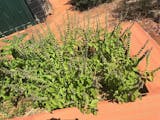Sage is a perennial woody perennial and is one of the traditional old tea, medicinal and spice herbs. Originally native to Asia Minor and North Africa, the sun-loving plant has been grown in Europe since ancient times. Sage smells aromatic and tastes velvety, spicy and slightly bitter. Due to its active substances, the effect is antibacterial, disinfectant, antispasmodic, diuretic and fungicidal. For internal and external treatments, mainly infusions, tea or extracted essential oil are used. It is best known for use as a mouthwash for minor injuries or inflammation of the teeth, gums or oral mucosa, and for sore throat.
General information
Plant family: Lamiaceae
Life Cycle: Perennial
Days to harvest: 150 days
Plant height approx.: 70 cm
Root Type: Deep Root
Nutrient requirements: Weak Eaters
Water Requirements: Low
Winter hardiness: Up to-28 °C
Location: Sunny
Floor: Permeable, moist, sandy, loamy, humus
PH: 7 to 8
Sowing and planting information
Germ Type: Dark germ
Seed Depth: 1 cm
Optimal germination temperature: 18-22 °C
Germination time: 10-28 days
Planting, row spacing: 50x60 cm
Optimal mixed culture: Thyme, rosemary, bean, pea, fennel, cress, carrot, lettuce, cabbage
Unfavorable mixed culture: Basil
Subtropic climate (Mediterranean) (e. g. B. Portugal, Spain, Italy)
Sow directly into the open air from March to August. We recommend pre-culture in small pots from January to August.
Moderate climate (e. g. B. Germany, Switzerland, Poland)
Sow directly into the open air from May. We recommend pre-culture in small pots from March to June.
General
Sow in rows.
Sage prefers a fully sunny location with a dry to moist, permeable, sandy and loamy soil. Prepare the soil for the herb with deposited animal manure. Avoid waterlogging.
Additional tips
The main harvest is carried out with late sowing in the second year. In order to quickly obtain a fine, crumbly and well-drained soil, an additional incorporation of biochar and primeval rock flour is recommended.
Type of propagation
Spread occurs via seeds and cuttings.
Care Plants
Cut the herb back generously to a height of 20 cm in early spring before the new shoot begins. Due to the initially slow growth of the plants, we recommend weeding the surrounding herbs regularly. In order to permanently use the medicinal and effective potential of the plant in the garden, the perennial should be replaced by a new one every 5 years. M It animal manure prepared beds and planting in mixed culture, replaces additional fertilization.
Germination ability of seeds: 2-3 years
Other Names
Botanical names: Salvia officinalis
English Names: Sage
German names: Sage, Real Sage
Portuguese names: Sálvia
Spanish Names: Sabio
French names: Suction



![Sage [Salvia officinalis]](http://www.benjis.net/cdn/shop/files/Salbei-Sage-Salvia-Salviaofficinalis-www.benjis.net.jpg?v=1710385730&width=1445)




